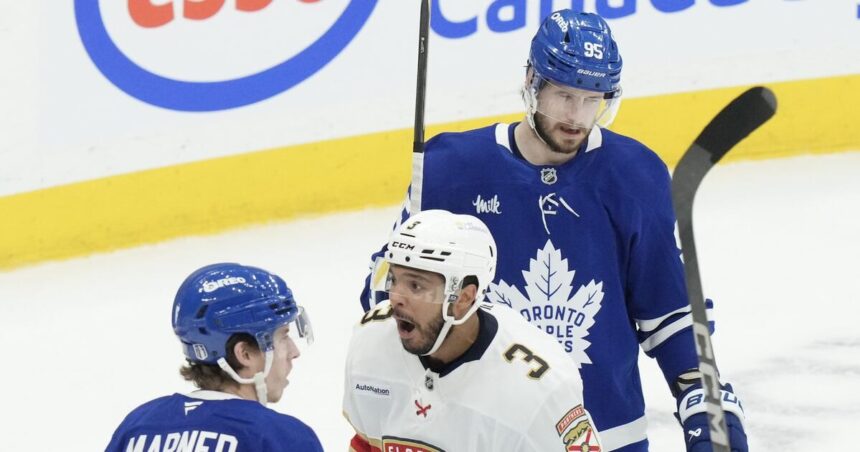The air in Toronto last night felt heavy with something more than just spring humidity. It carried the weight of decades of hope, of perpetually renewed faith, and of that particularly Canadian brand of sports heartbreak that has become almost ritualistic for Maple Leafs fans. As the final buzzer sounded on yet another Game 7 elimination, the collective sigh of disappointment from a city could practically be heard across Lake Ontario.
This wasn’t supposed to be the script for 2024. The Leafs entered the playoffs with what many analysts considered one of their most balanced rosters in years. Auston Matthews had just completed a historic 69-goal season, a remarkable feat that earned him the Maurice “Rocket” Richard Trophy with room to spare. Mitch Marner had silenced many critics with consistent playmaking throughout the regular season. The defense, while not perfect, seemed more solid than in previous campaigns.
“We believed this year was different,” said lifelong fan Geeta Sharma, 43, standing outside Scotiabank Arena with thousands of others who had gathered to watch on the outdoor screens. “You have to believe, right? Otherwise, what’s the point?”
Indeed, what is the point? The Toronto Maple Leafs last hoisted the Stanley Cup in 1967 – before the moon landing, before the internet, before most of their current fans were even born. For context, the Montreal Canadiens have won the cup ten times since Toronto’s last victory. This extended drought has transformed from mere sports statistics into something resembling cultural mythology in Canadian sports lore.
I’ve covered Toronto sports for over a decade at CO24 Culture, and each year the pattern proves remarkably consistent: regular season success, playoff appearance, heightened expectations, and then – the falling axe of elimination, usually in particularly painful fashion. Last night’s game was a microcosm of this cycle, with moments of brilliance overshadowed by critical mistakes at crucial junctures.
What makes this loss particularly bitter is how it played out. After falling behind early, the Leafs mounted what seemed like the comeback story fans have been waiting for. Matthews scored twice, igniting the arena with the kind of electricity only hockey can generate in a Canadian metropolis. But defensive lapses in the third period proved fatal, a recurring theme that has haunted this franchise throughout their playoff disappointments.
Coach Sheldon Keefe looked visibly drained in the post-game press conference. “We put everything into this,” he said, voice barely above a whisper. “The players gave everything they had. Sometimes that’s not enough, and that’s the hardest part to accept.”
The question of “what next” now looms over the organization like a storm cloud. The current trends in NHL team building suggest major changes often follow such disappointments. Will General Manager Brad Treliving make significant roster adjustments? Will the core four of Matthews, Marner, Tavares, and Nylander remain intact? These are the questions that will dominate Toronto sports radio and dinner conversations for months to come.
Sports psychologist Dr. Lauren Chen, who has worked with professional teams, offers an interesting perspective on the Leafs’ recurring playoff failures. “There’s a psychological burden that builds with each disappointment,” she explains. “Players begin to press, to overthink in critical moments. The weight of history and expectation becomes almost tangible on the ice.”
This psychological dimension can’t be overlooked when analyzing the team’s performance. In crucial Game 7 moments, the Leafs have often appeared to be battling not just their opponents, but also their own ghosts – the specters of past failures that hover over every power play and penalty kill.
From a cultural standpoint, the Leafs’ struggles represent something deeper about Toronto itself – a city perpetually reaching for greatness while grappling with its own complex identity. As I’ve often discussed in CO24 Opinions, sports teams often embody the psychological profile of their home cities, and few examples are as striking as the relationship between Toronto and its beloved but frustrating hockey club.
For now, fans will do what they’ve become experts at – they’ll regroup, they’ll heal, and somehow, when October rolls around, they’ll find new reserves of hope. Because if there’s one thing more remarkable than the Maple Leafs’ ability to lose in heartbreaking fashion, it’s their fans’ capacity to believe that next year will finally be different.
As the lights dimmed at Scotiabank Arena last night, a small group remained in their seats, silent and motionless. They weren’t ready to leave, to concede that another year had slipped away. In their reluctance was the essence of fandom itself – that irrational, beautiful devotion that defies logic and persists despite all evidence suggesting it should be abandoned.
Will next year finally break the pattern? History suggests skepticism, but sports have always had a way of making fools of cynics. And somewhere in Toronto today, a child is shooting pucks against a garage door, wearing a blue and white jersey, completely unburdened by the weight of history. Perhaps that’s where hope truly lives.










